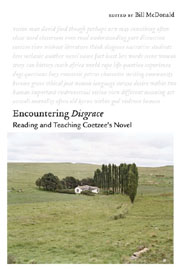Book contents
- Frontmatter
- Contents
- Acknowledgments
- Introduction
- I Reading Disgrace
- II Reading Disgrace with Others
- 11 Community Reading: Teaching Disgrace in an Alternative College Classroom
- 12 Out of the Father's House into a Community of Readers
- 13 Sympathy for the Devil: On the Perversity of Teaching Disgrace
- 14 Teaching Disgrace in the Large Lecture Classroom
- 15 Discussing Disgrace in a Critical Theory Class
- 16 Disgrace in the Classroom: A Tale of Two Teaching Strategies
- 17 The Bodies of Others: A Meditation on the Environs of Reading J. M. Coetzee's Disgrace and Caryl Phillips's The Nature of Blood
- 18 Disgrace as a Teacher
- Works Cited
- Notes on the Contributors
- Index
12 - Out of the Father's House into a Community of Readers
from II - Reading Disgrace with Others
Published online by Cambridge University Press: 12 September 2012
- Frontmatter
- Contents
- Acknowledgments
- Introduction
- I Reading Disgrace
- II Reading Disgrace with Others
- 11 Community Reading: Teaching Disgrace in an Alternative College Classroom
- 12 Out of the Father's House into a Community of Readers
- 13 Sympathy for the Devil: On the Perversity of Teaching Disgrace
- 14 Teaching Disgrace in the Large Lecture Classroom
- 15 Discussing Disgrace in a Critical Theory Class
- 16 Disgrace in the Classroom: A Tale of Two Teaching Strategies
- 17 The Bodies of Others: A Meditation on the Environs of Reading J. M. Coetzee's Disgrace and Caryl Phillips's The Nature of Blood
- 18 Disgrace as a Teacher
- Works Cited
- Notes on the Contributors
- Index
Summary
He has long ceased to be surprised at the range of ignorance of his students. Post-Christian, posthistorical, postliterate, they might as well have been hatched from eggs yesterday. So he does not expect them to know about fallen angels or where Byron might have read of them. What he does expect is a round of goodnatured guesses which, with luck, he can guide toward the mark.
— Professor David Lurie, DisgraceWhen I joined the fall 2006 Coetzee seminar taught by recent Johnston Center graduate Matthew Gray and our editor, Bill McDonald, I was self-conscious about my status as a historian with over twenty years of experience in the classroom. I feared that students would expect me to read as an “expert,” yet like them I was a newcomer to J. M. Coetzee, his work, and South African fiction generally. At first I planned to compensate by relying on my disciplinary expertise, including some knowledge of comparative South African and North American history, and by developing an essay on a long-contemplated theme — “fathers and daughters” — for this collection. But when the seminar started, I found little inspiration to be a “visiting expert” because I felt as newly hatched as the students. So I decided to follow that feeling, viewing the course largely as a beginner as well as a veteran. It proved to be an eye-opening choice in several ways. For example, when I expressed my ignorance or ambivalence or frustration with Coetzee, it seemed to make it easier for my younger classmates to do the same. It allowed me to empathize with the fears that most undergraduates bring to a challenging class.
- Type
- Chapter
- Information
- Encountering 'Disgrace'Reading and Teaching Coetzee's Novel, pp. 248 - 263Publisher: Boydell & BrewerPrint publication year: 2009

